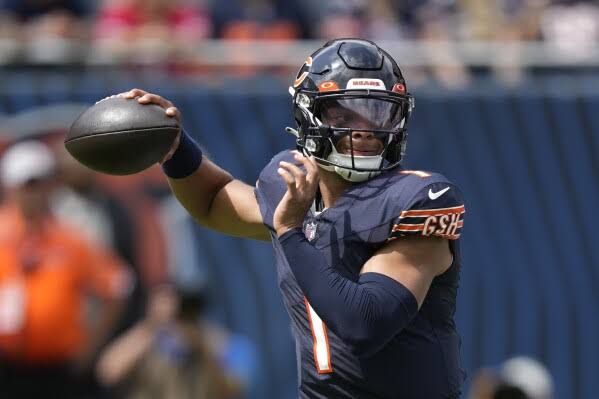
Disagreement: Justin Fields Refuses to Be Signed by the Steelers Due to Payment Issues
In the world of professional sports, contract negotiations can often lead to tensions, disagreements, and even surprising decisions. One such scenario recently unfolded when Chicago Bears quarterback Justin Fields reportedly refused to entertain an offer from the Pittsburgh Steelers due to issues surrounding the payment terms and overall financial arrangements. This disagreement highlighted not only Fields’ personal stance on his worth but also the larger dynamics of NFL contracts and the sometimes complex relationship between athletes and teams.

The Context: Justin Fields’ Career Trajectory
Since being drafted by the Chicago Bears in 2021, Justin Fields has shown flashes of brilliance on the field. Despite the Bears’ struggles in recent years, Fields’ athleticism, strong arm, and ability to make plays with his legs have made him one of the most intriguing young quarterbacks in the NFL. His potential has undoubtedly sparked interest from many teams, including the Steelers, who have long been searching for a successor to Ben Roethlisberger.
In Pittsburgh, the Steelers are in the midst of a rebuild. Although they have a solid defense, their offensive unit has struggled, especially at the quarterback position.
The team has had rotating quarterbacks since Roethlisberger’s retirement, with Kenny Pickett showing promise but not quite meeting the high expectations placed on him. The Steelers front office recognized Fields’ potential and reportedly extended an offer to him. However, it was the terms of the deal that led to an unexpected breakdown in negotiations.

The Financial Disagreement
At the core of the disagreement was the financial aspect of the potential deal. Justin Fields, who has shown he can be a franchise quarterback, understandably wanted a contract that reflected his value to the team. Reports suggest that the Steelers’ offer did not meet Fields’ expectations, particularly in terms of guaranteed money and the structure of the deal.
In the NFL, player contracts are often laden with complexities, such as base salaries, signing bonuses, and incentives. What matters most, however, is the amount of guaranteed money—a figure that provides financial security for the player, ensuring they will be compensated even if the team decides to part ways early. Fields, with his increasing value as a quarterback, wanted an offer that mirrored his potential to lead a team into the future.
The Steelers’ offer, according to sources, did not provide the level of guaranteed money that Fields had in mind. Reports indicated that while the base salary might have been comparable to his value, the lack of substantial guarantees made Fields hesitant.

In professional sports, especially in a league as physically demanding as the NFL, athletes often seek contracts that minimize financial risk and offer stability. Fields, understanding his worth as a dual-threat quarterback, clearly found the Steelers’ proposal lacking in these areas.
The Role of Agent Negotiations
It is important to note that agent negotiations often play a pivotal role in such disagreements. Fields’ representation was said to have been clear about the expectations for the quarterback’s next deal. Agents represent the interests of their clients, ensuring that players receive contracts that reflect their abilities, marketability, and long-term potential.
For a quarterback like Justin Fields, whose style of play emphasizes mobility and versatility, the risk of injury is higher than that of a traditional pocket passer.
The decision to reject an offer that didn’t meet his financial demands could very well have been influenced by the advice of his agent, who would be advocating for Fields to secure financial security that accounts for both his potential and the inherent risks of his playing style.
Pittsburgh’s Perspective
On the other hand, the Steelers’ front office likely saw the deal from a different perspective. The team has been cautious with its finances in recent years, particularly with regard to quarterback contracts. They may have been unwilling to offer Fields the kind of long-term financial commitment he was seeking, given their current roster construction and salary cap constraints.
The Steelers are a team known for their frugality, often focusing on building their roster through the draft and prioritizing financial flexibility. In a world where quarterback salaries are ballooning, it is understandable that the Steelers would be cautious about offering a large chunk of their salary cap to a player who, while talented, had yet to consistently prove himself as an elite quarterback.
Additionally, the Steelers may have been uncertain about Fields’ long-term fit within their offensive system. While Fields has shown immense talent, he has also struggled at times with consistency and decision-making. The Steelers may have had reservations about investing heavily in a quarterback with a less-than-sterling track record, especially given that they would be tying up a significant portion of their cap space in him.
The Fallout and the Bigger Picture
Ultimately, the refusal of Justin Fields to sign with the Steelers over payment issues raises important questions about the economics of the NFL. It underscores the increasing financial demands of elite quarterbacks and the challenge faced by teams that are trying to balance long-term success with short-term financial flexibility.
For Fields, his decision represents a statement of self-worth. He understands that his skills and potential make him a valuable asset, and he’s not willing to accept less than he feels he deserves.

For the Steelers, this situation serves as a reminder of the delicate balance teams must strike when pursuing star players. It is clear that in today’s NFL, the value of a quarterback extends beyond just their performance on the field; it encompasses their marketability, their potential for growth, and their ability to carry a team.
As both Fields and the Steelers move forward, this disagreement highlights the ever-evolving landscape of NFL contracts, player empowerment, and team-building strategies. Whether Fields eventually signs with another team or stays with the Bears, this incident serves as a microcosm of the broader financial and strategic dynamics that shape the modern NFL.





